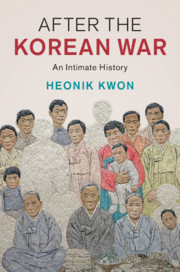Crossref Citations
This Book has been
cited by the following publications. This list is generated based on data provided by Crossref.
Brazinsky, Gregg A.
2021.
Remembering Ŏmŏni: Using Chinese Memoirs to Understand Sino-North Korean Interactions during the Korean War.
Journal of Korean Studies,
Vol. 26,
Issue. 2,
p.
251.
Foley, James Alexander
2021.
KOREA'S FIRST‐GENERATION DIVIDED FAMILIES: The End of the Line?.
World Affairs,
Vol. 184,
Issue. 3,
p.
381.
Hwang, Su-kyoung
2021.
The Korean War and the environment.
Critical Asian Studies,
Vol. 53,
Issue. 4,
p.
517.
Park, Sandra H.
2021.
The Interrogation Rooms of the Korean War: The Untold HistoryThe Hijacked War: The Story of Chinese POWs in the Korean War.
Journal of Korean Studies,
Vol. 26,
Issue. 1,
p.
156.
Winter, Jay
2022.
The Cultural History of War in the Twentieth Century and After.
Kal, Hong
2022.
Retrospective Witnessing: Paintings of Grievous Deaths in the Korean War.
Asian Studies Review,
Vol. 46,
Issue. 3,
p.
394.
2023.
Probing Arts and Emergent Forms of Life.
p.
100.
2023.
Probing Arts and Emergent Forms of Life.
p.
1.
2023.
Probing Arts and Emergent Forms of Life.
p.
71.
Martin, Bridget
2023.
American Imperial Sovereignty and Militarised Land Dispossession During the Korean War.
Geopolitics,
Vol. 28,
Issue. 5,
p.
2111.
2023.
Probing Arts and Emergent Forms of Life.
p.
253.
2023.
Probing Arts and Emergent Forms of Life.
p.
31.
2023.
Probing Arts and Emergent Forms of Life.
p.
221.
2023.
Probing Arts and Emergent Forms of Life.
p.
165.
2023.
Probing Arts and Emergent Forms of Life.
p.
197.
Fennelly, Katherine
2023.
Archaeology, Emotional Storytelling, and Performance.
Public Archaeology,
p.
1.
2023.
Probing Arts and Emergent Forms of Life.
p.
12.
2023.
Probing Arts and Emergent Forms of Life.
p.
132.
Choi, Jin Young
2023.
Embodying Antiracist Christianity.
p.
95.
Kim, Seong Nae
and
Hwang, Merose
2023.
Enduring violence and commemoration: Korea’s Cheju April 3 Incident.
Violence: An International Journal,
Vol. 4,
Issue. 1-2,
p.
83.





